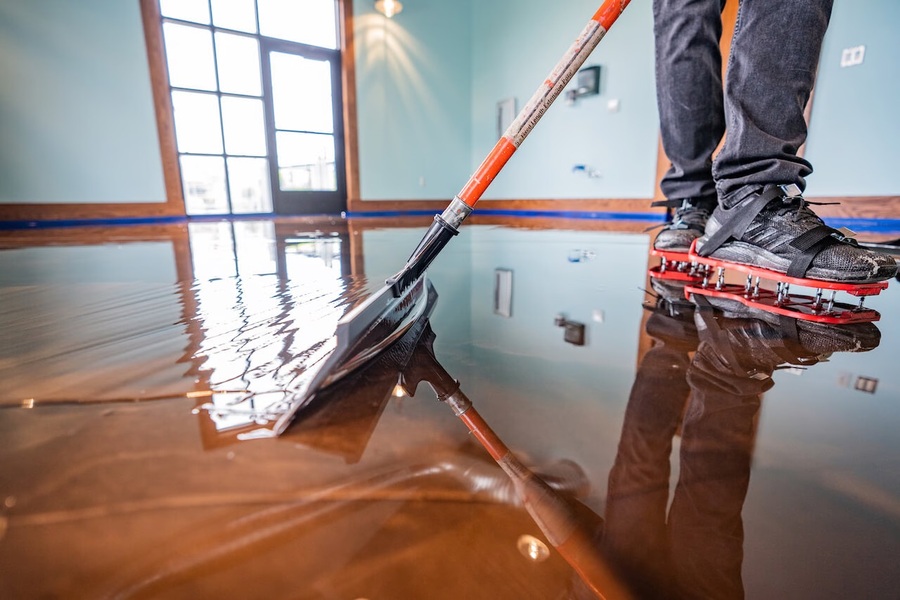Learn the Benefits of Epoxy Coatings
Durability
One of the primary reasons for choosing epoxy coatings is their unparalleled durability. Concrete floors coated with epoxy are incredibly resistant to high levels of wear and tear, thereby prolonging the life of your floor. Epoxy-coated floors can withstand heavy foot traffic, mechanical loads from vehicles, and the dropping of tools without chipping or cracking. This resilience makes them perfect for garages, where such situations are commonplace.
Chemical Resistance
Garages often become a hub of various chemical interactions, from automotive fluids like oil and gasoline to household chemicals. Epoxy coatings form a seamless and impenetrable surface that can withstand these chemical spills without staining or degrading. This characteristic makes cleaning spills or leaks more manageable and reduces the need for costly repairs or flooring replacement.
Aesthetic Appeal
Epoxy coatings offer a stunning visual upgrade to the typical gray, drab concrete garage floor. They are available in a variety of colors and styles, allowing for custom designs and patterns. The glossy finish of epoxy also brightens up the garage space by reflecting light, creating a more welcoming and professional appearance. In addition, epoxy floors are seamless and smooth, making them easy to sweep and maintain.
Best Practices for Applying Epoxy Coatings
Proper application of epoxy coatings is crucial to ensure their maximum benefits. Following are some tips and techniques for achieving the best results.
Surface Preparation
Surface preparation is perhaps the most critical step in the epoxy application process. The concrete surface must be clean, dry, and free of any previous coatings, oils, or solvents that could hinder the epoxy’s adhesion. This can be accomplished by thorough cleaning, followed by grinding or shot-blasting the surface to create a profile for the epoxy to bond with.
Moisture Test
Before applying epoxy, it’s essential to perform a moisture test on the concrete surface. Epoxy does not adhere well to damp surfaces, and moisture can lead to issues such as peeling or bubbling of the coating. A simple plastic sheet test can help determine the presence of moisture: Tape a plastic sheet over a small section of the floor and leave it for 24 hours. If there is condensation on the plastic or the concrete looks darker after removal, the surface is too damp for epoxy application.
Optimal Temperature
Epoxy coatings have an ideal temperature range for application, typically between 60°F and 85°F. Too cold, and the epoxy may not cure properly; too hot, and the epoxy might cure too quickly, not giving it time to bond with the surface properly. Check the manufacturer’s instructions for the best temperature range for your specific product.
Correct Mixing
Epoxy coatings usually come in two parts that must be mixed together before application: the resin and the hardener. These must be mixed thoroughly and in the correct ratio as the manufacturer directs. Incorrectly mixed epoxy may not harden properly, creating a soft or sticky floor.
Even Application
When applying the epoxy coating, ensure an even application across the entire surface. This can be achieved by using a roller or squeegee and applying the coating systematically and methodically. Overlapping strokes can help prevent lines or marks. Applying two coats of epoxy for a more durable finish is also a good idea.
Safety Measures
Always remember to wear appropriate personal protective equipment when working with epoxy coatings, including safety glasses, gloves, and a respirator if needed. Epoxy can be hazardous if it comes in contact with the skin or eyes or if the fumes are inhaled.
Epoxy coatings offer an exceptional solution for turning a regular garage floor into a functional, resilient, and aesthetically pleasing surface. The process of applying epoxy may require a bit of time and effort, but the results are well worth it. Remember, correct preparation and application are key to unlocking the full potential of these coatings. With the right tools and techniques, your garage floor can be transformed into a stylish, hard-wearing, and easy-to-maintain space.
Key Takeaways:
- Epoxy coatings provide superior durability, making them ideal for high-traffic areas like garages.
- These coatings are highly resistant to chemical spills, including automotive fluids and household chemicals, minimizing staining and damage.
- Epoxy coatings enhance the aesthetic appeal of garages, offering a variety of colors, styles, and a glossy finish that reflects light.
- Proper surface preparation, including thorough cleaning and grinding or shot-blasting, is crucial for successfully applying epoxy coatings.
- Before application, a moisture test should be conducted to ensure the surface is dry enough to adhere to the epoxy.
- The optimal temperature for epoxy application typically lies between 60°F and 85°F. Too cold or too hot can adversely affect the curing process.
- Epoxy coatings usually consist of a resin and a hardener, which must be mixed thoroughly and in the correct ratio for successful application.


Recent Comments